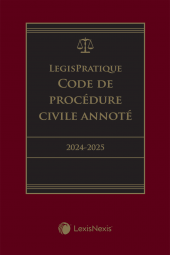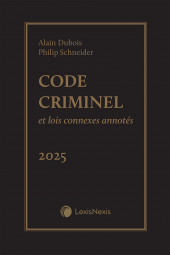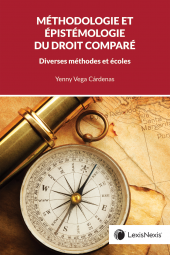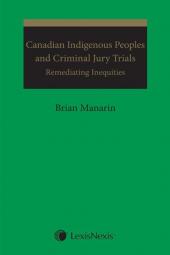Canadian Indigenous Peoples and Criminal Jury Trials: Remediating Inequities
One Year Subscription Only Terms
Subscribers receive the product(s) listed on the Order Form and any Updates made available during the annual subscription period. Shipping and handling fees are not included in the annual price.
Subscribers are advised of the number of Updates that were made to the particular publication the prior year. The number of Updates may vary due to developments in the law and other publishing issues, but subscribers may use this as a rough estimate of future shipments. Subscribers may call Customer Support at 800-833-9844 for additional information.
Subscribers may cancel this subscription by: calling Customer Support at 800-833-9844; emailing customer.support@lexisnexis.com; or returning the invoice marked 'CANCEL'.
If subscribers cancel within 30 days after the product is ordered or received and return the product at their expense, then they will receive a full credit of the price for the annual subscription.
If subscribers cancel between 31 and 60 days after the invoice date and return the product at their expense, then they will receive a 5/6th credit of the price for the annual subscription. No credit will be given for cancellations more than 60 days after the invoice date. To receive any credit, subscriber must return all product(s) shipped during the year at their expense within the applicable cancellation period listed above.
Détails des produits
"The book includes a detailed table of contents, a table of cases, and a table of statutes. As well, there are significant footnotes, including both commentary and references. I recommend it for academic libraries, particularly those with a significant criminal law collection. It will be helpful in addressing systemic and legislative factors that affect Indigenous people who are involved in the criminal justice system."
Reviewed by Lori O'Connor, Crown Prosecutor
Melfort, Saskatchewan
See Review in 2020 Canadian Law Library Review 45:1 (page 22-23)
As author Brian Manarin states in the Preface to Canadian Indigenous Peoples and Criminal Jury Trials: Remediating Inequities, “Indigenous Peoples are overrepresented in all aspects of the Canadian criminal justice system. Most dramatic are their rates of incarceration.” He goes on to explain that one possible way of reducing conviction and incarceration rates is to increase the fairness and effectiveness of the jury selection process. Manarin then proceeds to offer an analysis of that process by considering Canadian jurisprudence and comparing the experiences in this country to those in England and the United States.
Issues worth examining
This new book addresses three primary questions:
- Should potential jurors be disqualified due to their criminal antecedents and what is the impact of such a policy on Indigenous Peoples?
- Does the “challenge for cause” procedure work fairly and effectively for Indigenous Peoples when attempting to expose partiality?
- Is the “peremptory challenge” option neutral in its application or potentially discriminatory against Indigenous Peoples?
In researching these questions, Manarin presents a critical examination of the present doctrinal and policy positions that are in place in Canada regarding who may serve on a jury and how the petit jury is assembled in the Superior Courts across the land. In particular, he challenges the presumption that Canadians with criminal antecedents are unsuitable for jury duty against both a historical backdrop and the present-day reality that one in 10 Canadian citizens has a criminal record. In addition, jury selection methods and “challenge” mechanisms are exposed as functionally ineffective and open to unsettling forms of abuse.
Ultimately, Manarin strives to come to conclusions and offer recommendations that, at the very least, will generate further discussion and possible changes to the legislation governing jury selection in criminal trials.
A useful and insightful resource for:
- Superior Court judges and the appellate courts that review their decisions
- Criminal trial and appellate counsel
- University and college professors and students who are teaching and studying law, criminology, psychology, political science, philosophy, social work and Indigenous affairs
- Federal, provincial and territorial government representatives
- Law enforcement agencies
- Indigenous groups
Table des matières
Chapter 1: Introduction
Chapter 2: Context setting: The unique position and circumstances of Indigenous Peoples in Canadian society
Chapter 3: Should potential jurors be disqualified due to their criminal antecedents and what is the impact of such a policy on Indigenous Peoples?
Chapter 4: Does the “challenge for cause” procedure work fairly and effectively for Indigenous Peoples when attempting to expose partiality?
Chapter 5: Is the “peremptory challenge” option neutral in its application or potentially discriminatory against Indigenous Peoples?
Chapter 6: Conclusions
Produits liés
-
 LegisPratique – Code de procédure civile annoté 2024-2025Date de sortie: September 30, 2024140,00 $
LegisPratique – Code de procédure civile annoté 2024-2025Date de sortie: September 30, 2024140,00 $ -
 Code criminel et lois connexes annotés, édition 2025 (Volume 1) + Guide du praticien (Volume 2) + Livre électroniqueDate de sortie: August 13, 2024175,00 $
Code criminel et lois connexes annotés, édition 2025 (Volume 1) + Guide du praticien (Volume 2) + Livre électroniqueDate de sortie: August 13, 2024175,00 $ -
 Méthodologie et épistémologie du droit comparé : Diverses méthodes et écolesDate de sortie: July 10, 2024100,00 $
Méthodologie et épistémologie du droit comparé : Diverses méthodes et écolesDate de sortie: July 10, 2024100,00 $
 Lexis Nexis
Lexis Nexis 